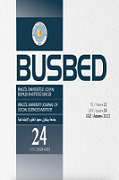FAILED MARRIAGES AND SPINSTERHOOD AS SYMBOLIC FEMINIST CONCEPTS IN THE VICTORIAN NOVEL
FAILED MARRIAGES AND SPINSTERHOOD AS SYMBOLIC FEMINIST CONCEPTS IN THE VICTORIAN NOVEL
Author(s): Veysel IsciSubject(s): Gender Studies, Studies of Literature, 19th Century, Theory of Literature
Published by: Bingöl Üniversitesi Sosyal Bilimler Enstitüsü
Keywords: Victorian novel; Marriage; Spinsterhood; Feminism; Women writers;
Summary/Abstract: In nineteenth-century Britain, a woman’s place was regarded to be in the domestic area, devoted to housework and family life. However, thanks to certain political, economic and social changes, women progressively began to engage in pursuits that were previously exclusive to the men. Writing a novel was one of these pursuits for some women in the Victorian era. Although under the pseudonym of a man, women writers like Mary Ann Evans published significant works during this era. In many of their works, these women writers challenged the role that women were supposed to take in Victorian society. Using various literary strategies, they opposed to conventional representations of the woman in Victorian novel. In this context, the present study examines two canonical works by George Eliot and Elizabeth Gaskell to illustrate how these women writers portray marriage and spinsterhood as symbolic feminist concepts. The findings of the study suggest that by illustrating devastating results of undesired marriages and offering a utopian world of happiness for spinsters, Eliot and Gaskell, respectively, take up feminist stances against oppressing power of patriarchal society in England in the Victorian era.
Journal: Bingöl Üniversitesi Sosyal Bilimler Enstitüsü Dergisi (BUSBED)
- Issue Year: 12/2022
- Issue No: 24
- Page Range: 325-332
- Page Count: 8
- Language: English

